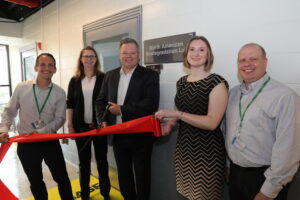
BASF opens Biodegradation and Microplastics Center of Excellence in North America
Canadian Plastics
Materials SustainabilityLocated at BASF’s site in Wyandotte, Mich., the center support customers seeking a broad range of biodegradable circular economy solutions.

BASF officials at the ribbon-cutting ceremony for the new Wyandotte site. Photo Credit: BASF
In a bid to help North American customers hit their circularity and sustainability goals, chemical maker BASF Corp. has opened its Biodegradation and Microplastics Center of Excellence at its site in Wyandotte, Mich.
The center’s targets include providing holistic, tailored solutions directly for customers supported through scientific studies and consulting, increasing speed-to-market for circular economy products, and advocating on sustainability topics. The center also includes a biodegradation laboratory, which BASF officially opened at a ribbon cutting ceremony attended by BASF representatives from across North America within research and business divisions.
According to BASF officials, the Wyandotte site has a broad R&D portfolio including chemicals, materials, formulations, analytics, and piloting. Because of this interdisciplinary setup, the site is poised with technical competencies, collaborative networks and centralized analytics, streamlining the R&D process.
“When it comes to analytical testing at the Wyandotte labs, information gained will vary from disintegration performance of compostable materials to biodegradation performance of novel chemistries, to unique insights on microplastics and the behavior of plastics through their life cycles,” BASF said .
The new laboratory will support biodegradable product development primarily in food service and packaging, agriculture, detergents, cleaning, and cosmetics industries. Furthermore, the lab will have the capability to assess rates of disintegration for novel compostable products designed to divert food waste to composting facilities. Closing the loop in the food value chain has a range of positive environmental impacts, from reducing potent methane generated in landfills to creating valuable compost that supports climate resilience by sequestering carbon, increasing water holding capacity for dry soils, preventing erosion, and restoring organic carbon to depleted agricultural soils.
The building of the biodegradation laboratory in North America is part of a broader network of similar labs at BASF globally, BASF said, all of which sharing the same vision.
